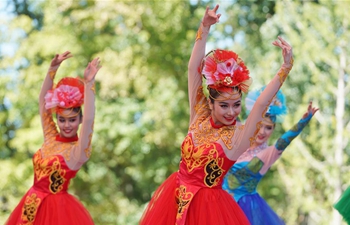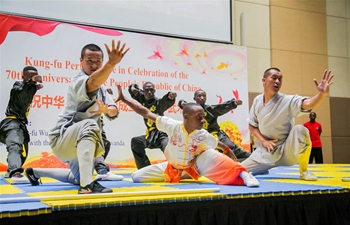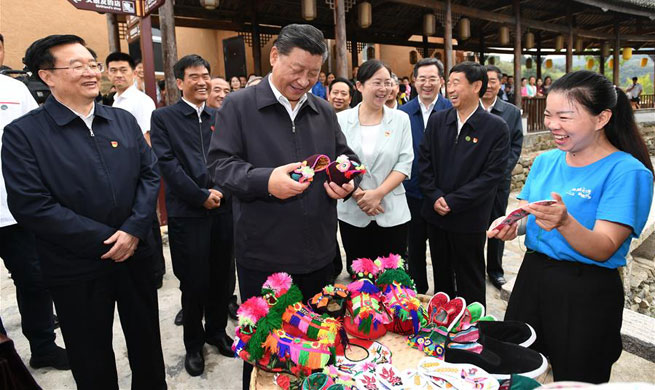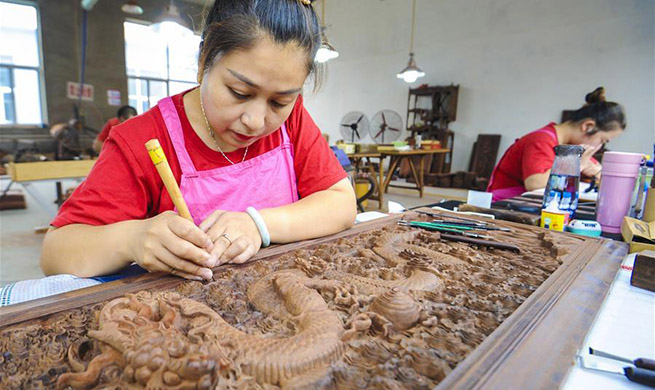by Misbah Saba Malik, Liu Tian
ISLAMABAD, Sept. 17 (Xinhua) -- China and Pakistan enjoy decade-long friendship since the two neighbors established diplomatic ties in the early 1950s, but cultural exchanges of the two nations can be dated back much earlier to the time of the ancient Silk Road.
History books record that over 1,000 years ago, revered Chinese Buddhist monks including Fa Xian and Xuan Zang travelled all the way to Pakistan to study Buddhism. In modern times, Chinese dramas and movies of Kung Fu have been screened every week at the country's national TV, enlightening Pakistanis about Chinese culture and traditions.
FROM KONG FU MOVIES TO MASTER CHEN
A whole generation of Pakistanis grew up watching Chinese Kong Fu movies of Bruce Lee and later on those of Jackie Chan. The kids born in the 1980s and 1990s have great interest in Chinese martial arts due to the action movies. The kids even nickname their scrappy fellows as "Bruce" to show their fondness for the Kong Fu star.
Stephen Chen trains dozen of such aspirants in a fitness club in a posh area of Islamabad. He speaks fluent Urdu to communicate with his students.
Fondly called as Master Chen by his students, the 42-year-old belongs to the third generation of a Chinese family living in Pakistan for decades. Born and bred in Pakistan, Chen loves the country, but his Chinese roots made him choose the profession for himself through which he is not only enkindling the spirit of learning martial arts in young Pakistanis, but also finding solace for himself by being connected to his Chinese background.
Master Chen calls himself a bridge between the cultures of Pakistan and China. Initially when he started training in the early 1990s, the response was very welcoming. At that time he could not afford to have a well-equipped club, and used to hold the training session at open ground, but he still had a big class of students and many of them have participated in and won medals at national and international level games.
Syed Basharat Hussain, one of the brightest students of the master, migrated from the southwest Balochistan province to Islamabad one year ago. Right after shifting to his new home, he joined the master's class.
"I am a fan of Jackie Chan and Bruce Lee since my childhood, so I naturally grew up with a fondness for martial arts. After shifting to Islamabad I was clear in my mind that I will get trained by a Chinese because he will teach me the authentic martial arts which I wanted to learn," the 14-year-old told Xinhua.
"And in just one year's time he trained me in many things specially in boxing, making me compete and win national level boxing championship."
Hussain was one of the very few in the country who directly got selected for national level boxing championship. "I was not so confident about my skills, but a week after joining the club, the master came to me one day and said that he saw a spark in me to do something big in boxing. I owe all my achievements to him. He goes with me on my every match."
After helping Hussain conquer the national games, Master Chen is helping the talent prepare for international level boxing competition next year.
A LANGUAGE FOR PROMISING FUTURE
With more and more job opportunities brought about by the China-Pakistan Economic Corridor (CPEC), the number of schools and universities teaching the Chinese language is also growing fast in Pakistan. Many top-ranked schools and universities including the National University of Sciences and Technology, Comsats University Islamabad and Arid Agriculture University Faisalabad have made Chinese language a mandatory course in their syllabus.
Mona Kanwal, manager of Chinese language program in Roots Millennium School, said that they started Chinese classes a decade ago, and at that time parents were not much interested in sending their children here, but now "the situation is entirely changed, almost every parent wants his (or her) child to learn Chinese."
According to figures provided by Islamabad-based think tank Pakistan China Institute, over 25,000 students are currently studying Chinese in different classes, and in 2010 the figure was less than 2,000.
In the meantime, studying in China, especially for medical and applied sciences, is also becoming popular for Pakistanis. The Chinese government has raised the number of Pakistani students being provided with scholarships to 20,000, and currently a total of about 30,000 Pakistani students are studying in China, with some of them studying on self-finance basis.
Muhammad Raza Chohan, academic director general at Higher Education Commission of Pakistan, told Xinhua that thousands of Pakistani students are studying in China in various majors under scholarship program.
TO MEET FUTURE WORLD TOGETHER
China is the world's largest e-commerce market and in recent years, Chinese mobile payment giant Alipay has extended support to Pakistani companies to provide digital financial services in the country.
In Pakistan due to lack of financial activity in villages, banks usually do not extend their branches to these less-developed areas. In the past people had to travel to towns or cities to withdraw money and pay their bills, but now mobile transactions are available at retail shops from where people can easily send or withdraw money and pay their bills, since the Alipay had tied with local mobile payment company Easypaisa.
Talking about the impact of China's technological innovation on Pakistan, Kalsoom Sumara, assistant professor at Centre of Policy Studies in Comsats University Islamabad, said that China has brought a huge technological revolution in Pakistan over the last two decades through introducing smart phones.
"In early 2000 when only the rich could afford mobile phones in Pakistan, Chinese mobile phones entered Pakistani market, and were sold like hot cakes because of their affordable price, and even the poor strata of the society got access to mobile phones," Sumra told Xinhua.
"Increase in the supply and usage of mobile phones changed the telecommunication landscape of the country and a sharp decrease in prices of phone call and message was witnessed. Later Chinese mobile companies Huawei, Oppo, ZTE and Lenovo introduced smart phones to the country, which gradually led to the trend of mobile banking and e-commerce in Pakistan."
Chinese telecom company Zong provides one of the fastest internet and other telecommunication services in Pakistan. According to Pakistan Telecommunication Authority, Zong had the highest number of 4G subscribers in Pakistan and it has recently tested 5G service in the country.
Hassan Daud, former project director of CPEC at the Ministry of Planning Development and Reform, told Xinhua that he has observed that the Chinese coming to the country bring with them their good values which they share with locals, and they also like to teach locals about new technologies and share their knowledge with them, which will help Pakistani youth a great deal in their professional career.
"Pakistani youth has a hope in CPEC, they believe that it will help strengthen their economy by industrialization, and the hope for a shared better tomorrow with China has intrigued them to know more about China and Chinese, and it gives people of my generation a hope that the friendship between future generations of Pakistan and China will be stronger and more cordial," Sabina Zakir, director of Communications and Outreach at Roots Millennium School, told Xinhua.













